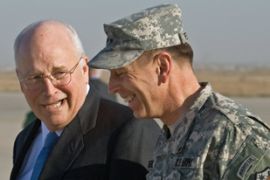Cheney pays surprise visit to Iraq
US vice-president arrives in Baghdad at the start of nine-day visit to Middle East.

During his tour, Cheney will reinforce the message from visits by Bush in January and Condoleezza Rice, the secretary of state, earlier this month, for Israelis and Palestinians to move forward on peace efforts dealt a blow by violence in Gaza and Israel.
|
“I don’t think that he’s going to be able to bring back anything meaningful because he’s got nothing to offer” Steven Simon, senior fellow for Middle Eastern studies at the Council on Foreign Relations |
“The mood has deteriorated incredibly in the last six weeks since the president was there,” Jon Alterman, director of the Middle East programme at the Center for Strategic and International Studies, said.
“From the outside it’s very hard to see that Secretary Rice was able to even arrest the slide let alone get things moving forward. My guess is the vice-president will be able to arrest the slide if not necessarily put things on track,” he said.
In Saudi Arabia, Cheney will discuss energy with King Abdullah as record-high oil prices strain the US economy, but he was not expected to repeat the call by Bush for Opec to increase production.
“I’m not sure he’ll seek anything more than a good and thorough discussion about the current situation in the global energy,” a senior US official said.
The United States wants Saudi Arabia, and other Arab allies like Egypt, to set up a diplomatic presence in Iraq by appointing an ambassador and opening an embassy in Baghdad.
“The United States can do a lot for Iraq, but we cannot provide Iraq with an anchor in the Arab world, a kind of legitimacy for the new Iraqi project that comes from being fully integrated in its neighbourhood,” the US official said.
“And I think clearly some of our friends in the Arab world can do more on that score,” he said on condition of anonymity.
Scepticism
But analysts were sceptical that Cheney would make any major breakthroughs.
“I don’t think that he’s going to be able to bring back anything meaningful because he’s got nothing to offer,” Steven Simon, a senior fellow for Middle Eastern studies at the Council on Foreign Relations, said.
“He represents a lame duck president, a floundering economy, a situation in which the US for all its efforts in Iraq has no leverage on the government in Baghdad,” Simon said.
Cheney throughout his trip will discuss the situation in Iraq, where security has improved, but violence persists five years after the US-led invasion.